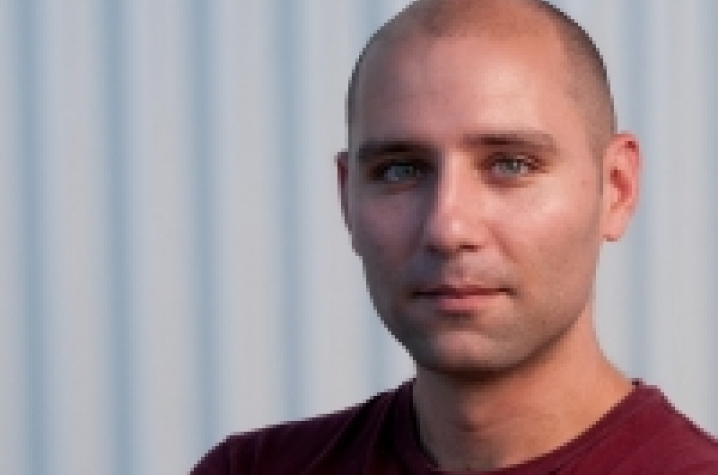WRD's Jim Ridolfo Connects With Samaritan Community

LEXINGTON, Ky. (Oct. 20, 2014) —As a graduate student at Michigan State University in 2008, Jim Ridolfo embarked on what he thought was a short-term research project that diverged from his dissertation work. This “secondary” project on Samaritan manuscripts has led to nationally funded, award-winning research for Ridolfo, now an assistant professor in the University of Kentucky College of Arts and Sciences’ departments of Writing, Rhetoric and Digital Studies and Jewish Studies.
An article that stemmed from his side project, “Delivering Textual Diaspora: Building Digital Cultural Repositories as Rhetoric Research,” was published by College English in November 2013 and was selected by the editor for the Richard Ohman Award. The award, which recognizes excellent scholarship in the field of rhetoric, is given annually by the National Council of Teachers of English (NCTE). Ridolfo’s article serves as a model of intellectual rigor and passionate study.
In his article, Ridolfo addresses accessibility of manuscripts that have cultural significance to the Samaritan people. The Samaritans are “one of the smallest religious and ethnic communities in the Middle East today,” Ridolfo writes. Numbering fewer than 800 people, the Samaritan population is concentrated in the midst of the current Israeli-Palestinian conflict.
Historic manuscripts belonging to the Samaritan people have been dispersed from the Middle East, across Europe and North America. There are even a few documents in South America and Australia. Ridolfo calls this “textual diaspora.” The word “diaspora” typically refers to people who have been displaced from their homeland. Ridolfo’s innovative use of the term to describe texts reiterates the significance these manuscripts and their removal have to Samaritans.
Housed in special collection libraries all over the world, Samaritan manuscripts are far from their cultural home and the people who cherish them. In fact, Ridolfo’s work on the Samaritan manuscripts began when he realized some were among the special collections library at Michigan State University.
Ridolfo was working on his dissertation in the Rhetoric and Writing program at MSU, and while looking through the library’s finding aid for the Chamberlin Warren Samaritan Manuscript collection, he came across the notes from a meeting between Benyamim Tsedaka, a Samaritan Elder, and the University Board of Trustees in 2003. Since 1982, Tsedaka had been making trips from his home in Holon, Israel, to Europe and North America and visiting various public and university libraries that housed Samaritan manuscripts.
After reading the notes from the 2003 meeting, Ridolfo got in touch with Tsedaka to ask if he wanted to work on a project together. The nature of that project continues to develop new contours. Ridolfo noted, “As you get involved in these long-term projects, larger research projects that you might not expect can emerge from doing this kind of work.”
The goal of the collaboration between Tsedaka and Ridolfo was to make these texts available to the Samaritan cultural stakeholders by digitalizing them. Since then, Ridolfo has worked closely with Tsedaka and other Samaritan leaders. He received a National Endowment for the Humanities Digital Startup Grant (2008-2009) and a Middle East and North Africa Regional Research Fulbright Scholarship (2011-2012) to develop the digitized archive. The funding also allowed him to conduct fieldwork in Israel.
For Ridolfo, this work has been so much more than a digitization project. Reflecting on the project as a whole, Ridolfo said, “I ended up learning a great deal about the diaspora of manuscripts in relation to what potential it might be for the Samaritans to communicate their cultural identity. As they explain to their neighbors who they are and why they’re distinct and different and why they have unique cultural heritage in this region, digital resources have a greater role in that.”
His article delves into the history of the Samaritan people and their diaspora as well as their current uses of the digitized manuscripts. Ridolfo is “really interested in what happens to this work down the road with the community, how they use the digitized texts, how they reference them and draw on them.” Therefore, also significant to the project are the relationships Ridolfo has developed with Tsedaka, other Samaritans, as well as archivists, librarians and other scholars.
Ridolfo brings an ethos of activism to academic research, which he attributes to his graduate program. The program in Rhetoric and Writing at MSU emphasized the appreciation for rhetoric in combination with organizations within and beyond the community. Ridolfo explained, “Since rhetoric is a practitioner art, we learn it through practice, helping other groups if acceptable, if applicable, and we learn from that process of involvement.”
One of the outcomes of Ridolfo’s involvement is his development of a Samaritan keyboard, free and downloadable from his website. The keyboard allows Samaritans, scholars and students to type more easily in Samaritan across applications that support the UNICODE standard. With this tool, users can continue to build on the Samaritan’s online presence in a new way—making it an active script on the web.
In thinking about his approach to digital studies and the people involved, Ridolfo recalled something one of his graduate school mentors, William Hart-Davidson, would say, “some of what we do is to put the humans back into humanities. And we’re not just dealing with inanimate texts, we’re dealing with the relationship of people to these texts.”
This relationship is something Ridolfo discusses at more length in his forthcoming book, "Digital Samaritans." It will be an enhanced text with maps, and images of manuscripts that Ridolfo created, readers will have their own unique relationship with his text.
Ridolfo never thought his work on these manuscripts would lead to a book, national funding, or continued collaboration with the Samaritan community, but his article and future publications on the Samaritan textual diaspora are a testament to the fruitful course one follows when one begins with passion for the subject and the people connected to it.
MEDIA CONTACT: Gail Hairston, 859-257-3302, gail.hairston@uky.edu




